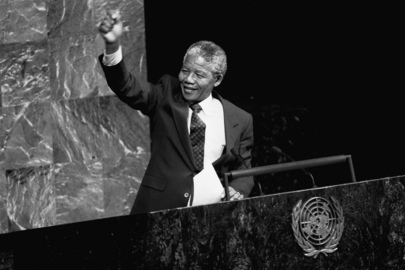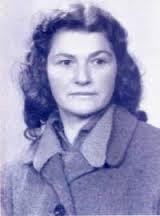They toppled walls that appeared insurmountable. What set them apart though is the vision and will to scale and swim against the tide of conventional wisdom. The greatest obstacle was frequently from within. Rather than change the fundamental values of human and political rights, they adapted tactics and politics and ultimately changed the flow of history. We came to see them as not only revolutionaries but as leaders of new societies at critical development stages. The examples and lessons of the heroes that emerged at the end of the last century are more relevant than ever to the real and projected fears, threats, and challenges facing us in this one. Authoritarianism has not altered its fundamental strategy. New walls and bars emerge in this century even as we celebrate the collapse of old ones and the heroes of that struggle for freedom.
Force of Idea & Perseverance:
Vaclav Havel, Tadeusz Mazowiecki, Srdjan Popovic and Nelson Mandela have passed. I have had the opportunity to meet my heroes, to learn and adopt from these giants. Their cages were neither gilded nor particularly benign, and thus the suffocation of freedom was more evident to them and us. Totalitarian communism came as protector and liberator from want, but became the cage. Conversely, the threat of communism become an excuse and perpetuated apartheid. Today's threats, real and projected, too frequently are answered with heightened militarism beyond borders and control within. National security is manifesting itself in real and virtual realities, as genuine protector but also exploiting fear and prejudice, a seduction of populism. While freedom could not be absolute for any individual, dissidents become the first victims of an overreaching state. Threats as hunger and intolerance would be understated while those that would rationalize a security/military response would be amplified, perhaps worse. Triumphs would be unduly claimed -- history is not written by the victor but the one who has the means to project themselves as such. The power of these heroes is that they could overcome with their vision and that they saw history before it would be co-opted.
Humility & Confidence:
Vaclav Havel led Czechoslovakia from cage to freedom, but it was not a single flight or hammer that knocked down the wall. Just recall the brutal suppression of the Prague Spring in 1968. Force of idea and ability to project verbally were the difference in the late 1980's -- The leader as writer, humble in personality and confident in demeanor. Without appealing to nationalist passions, he helped deliver an amicable separation of the two main regions of his country -- it did not matter whether the divorce producing the Czech Republic and Slovakia was justified. History would judge the means as much or more as the end result.
Havel though saw freedom and human rights not bounded by borders or walls. He saw Europe as a whole, not as the have and have nots. The aggression and genocide directed against Bosnia & Herzegovina (BiH) was undermining the vision of a new Europe. On that hot summer day in 1995, a self-congratulatory European elite celebrating the opening of another physical manifestation of a united continent, a "Human Rights Building" in Strasbourg, was inclined to ignore the contradictions and hypocrisy. Havel and I had been witnessing EU powers and NATO stand by as Serbia's nationalist paramilitary and military under General Ratko Mladic and Slobodan Milosevic ravaged BiH. From Visegrad to Prijedor, BiH had become scene of the most horrendous crimes and genocide since the Holocaust. European indifference or perhaps even acquiescence was once again culpable. In previous conversations I knew that we shared this view, but Havel's courage and capacity to speak plainly was perhaps lost in his soft-spoken and unassuming manner, that is until he stepped forward to the lectern. The European establishment, as conventional wisdom would deem, probably had invited Havel and I to praise the old-Europe as the Czech Republic and BiH had obvious aspirations and need to become part of the family. Instead, Havel provided a sobering rebuke:
This is a war for our own future a war of those to whom their tribal otherness is the ultimate value against all those who embrace higher values than the blood group which they happen to belong to. This war is waged against us all, against human rights, against coexistence of people of different nationalities or religious beliefs. The war in Bosnia is in fact a war against meaningful human coexistence based on the universality of human rights derived from the universality of the primeval human experience of the universe. It is an attack of the darkest past on a decent future, an attack of evil on the moral order. We have to stop this war. Yet, we shall not stop it by engaging in hopeless attempts work out compromises between a number of othernesses, compromises whose consequences would amount to confirming otherness as the supreme principle. There is only one way in which we can stop the war without being defeated, if this is still in fact possible: by calling evil evil, by pointing out who is to blame, and who is the victim, by saying at last in no uncertain terms what this war is all about.(Pres. Vaclav Havel, June 29, 1995)
New Europe not Founded upon Embrace of Nationalist Politics & Hypocrisy:
Tadeusz Mazowiecki led the long struggle to free Poland from behind the Iron Curtain and then became the first Prime Minister of a state seeking to move beyond. The seeds of a new, reconciliation and economically growing Poland were sewn under his leadership at a critical juncture. As Vaclav Havel, his vision extended beyond the borders of his country. He was appointed as UN Human Rights Rapporteur for BiH. His reports were unequivocal over the several years as the conflict persisted. Mazowiecki became increasingly critical due to the inaction and effective acquiescence to the ethnic cleansing. As with Havel, the big powers had expected a lap dog eager to please but years of suppression under Soviet domination had enhanced both integrity and courage. In late July of 1995, he finally resigned after the UN designated and NATO protected "safe area" of Srebrenica had been overrun by Mladic's forces. He accused those who had assumed responsibility for defending the safe areas of giving a "green light" (a description that we have shared) to Mladic's and Milosevic's forces in the upcoming assault upon the safe area of Zepa as well as the one just concluded upon Srebrenica. Mazoweicki's key description of European leaders of the time was "hypocrisy."
We fought in Poland against a totalitarian system in the hope of another Europe. How can one imagine that the children of the men and women we are abandoning today can create the Europe of tomorrow? We are hypocritical as far as Bosnia is concerned when we are claiming to defend it but in reality we are abandoning it.(Mazowiecki letter of Resignation, July 27, 1995 from London)
Mazowiecki's letter was met with appreciation for service and integrity from Serbia's anti-war NGO "Center for Anti-War Activities" as well as Bosnian political and civic leaders. I was honored to have worked with him. The response of most EU and US leaders was embarrassed silence.
Serbia's Dissident Against Communism & Fascism:
The notion that the conflict in BiH was ethnically and/or religiously motivated was largely a tool of the perpetrators and a convenient rationalization for inaction. Ethnicity and religion, as during WWII, were employed to identify victims and whip up fear, xenophobia, and nationalism by an elite seeking to perpetuate an absolute hold on power. Srdjan Popovic had defended clients against not so benign Communist Yugoslav authorities. After the dissolution of that state, he also became an activist against the rise of a neo-fascist Milosevic Regime. For a while he effectively became exiled in the United States. As dark and caffeine driven was the coffee we shared, I was impressed even more by intense deep blue eyes that reflected his clear and direct language. Popovic would return to his home in Belgrade where he continued to confront the scourge of nationalism as it had replaced communism as the rationalization for new authoritarianism.
Truth & Reconciliation as Foundation for Pluralism & Democracy:
Nelson Mandela was still seated at the side of the UN Security Council when we met, but soon his leadership would be central to a peaceful transition and a new South Africa. Mandela's legacy has been now frequently rewritten to suit prevailing powers, some of whom had previously branded him as communist and even terrorist. Mandela was not a pacifist, but he put aside armed conflict given the opportunity of peacefully dethroning Apartheid. He advocated against vengeance and promoted the "Truth & Reconciliation" process but as the rule of law had prevailed in establishing the moral, political and legal bankruptcy of those advocating racial/ethnic divisions. Everyone now, from rock stars to mining executives to politicians, want to adopt Nelson Mandela, but when he was in prison he was largely orphaned to the decrepit Apartheid regime. Perseverance, a moral and leadership compass, and of course victory changed it all.
Bosnia & Herzegovina needs its own Nelson Mandela. Judge Richard Goldstone of South Africa who presided over South Africa's Truth & Reconciliation Commission was appointed the first Prosecutor for the UN established "Ex-Yugoslavia Criminal Tribunals." Perhaps that may have helped spark Bosnia toward a return to a pluralistic society. However, the rule of law and the purported values of a new Europe advocated by Havel, Mazowiecki, and Popovic were betrayed, as they had predicted and feared. Ethnic divisions remain the dominant political vocabulary and currency of BiH and region. A new European variation of Apartheid has taken root and it will take fresh courage to overcome. The heroes have largely passed but their vision for a progressive future survives within many of us.
Women as Heroes:
My first hero was my mother, who unfortunately passed away at a relatively young age, before the Iron Curtain collapsed and Bosnia & Herzegovina regained its independence. Dr. Aziza Sacirbegovic has a street named after her in Sarajevo, but she was a hero way before I was born. She rescued refugees from slaughter by fascist forces during WWII. She was educated in an Islamic madrasa and became a respected physician. She was an observant Muslim, but also defied stereotypes or anyone's notion of orthodoxy. She taught me how to read the Koran but also invested in me Islamic and humanistic values. She dressed as a modern women even as she prayed and fasted with disciplined devotion. From her I learned respect for other cultures and shared a love for all life including animals. After several years (as my father) in a communist jail, her yearning for freedom reluctantly encouraged her to start life anew as a refugee.
Empowered by Women:
While I'm proud of my contributions in empowering women, from work with the Rome Statute establishing the International Criminal Court to those with whom I have worked professionally, it is I that will most benefit from women undertaking a greater share of piloting the future. In Serbia, women as Natasha Kandic and Sonja Biserko remain steadfast in opposing nationalistic politics while promoting both a true picture of the past and progressive vision of the future for their homeland and the region. Within BiH, mothers, sisters and daughters as the "Mothers of Srebrenica" led by Munira Subasic are paving the way for a genuine reconciliation among all victims by also insisting upon truth and the rule of law. Perhaps Ms. Subasic or one of the daughters of the victims of ethnic cleansing in BiH will be the next Nelson Mandela?
UN PHOTO/Pernaca Sudhakaran: Nelson Mandela before becoming President, raises his fist in the air while addressing Special Committee Against Apartheid in the UNGA Assembly Hall.
Family Portrait Gallery: Dr. Aziza Sacirbegovic as a Young Woman


